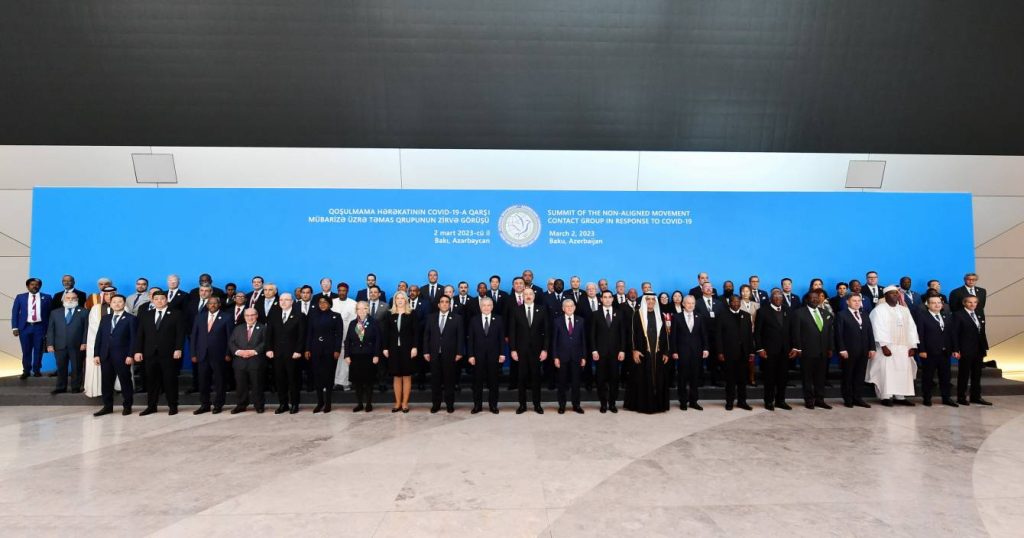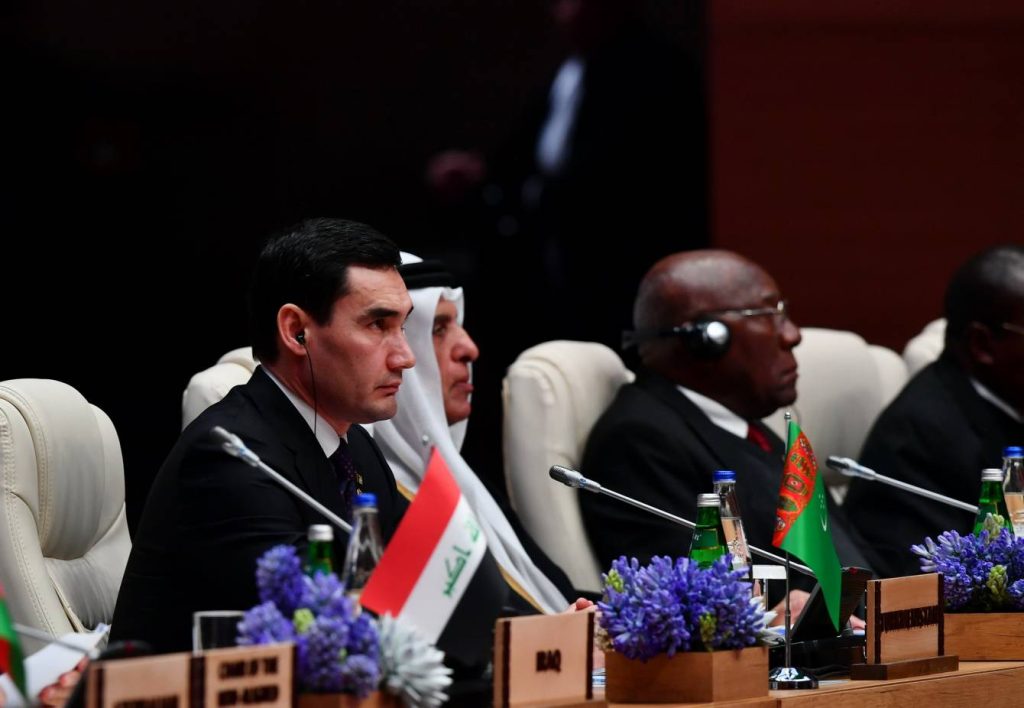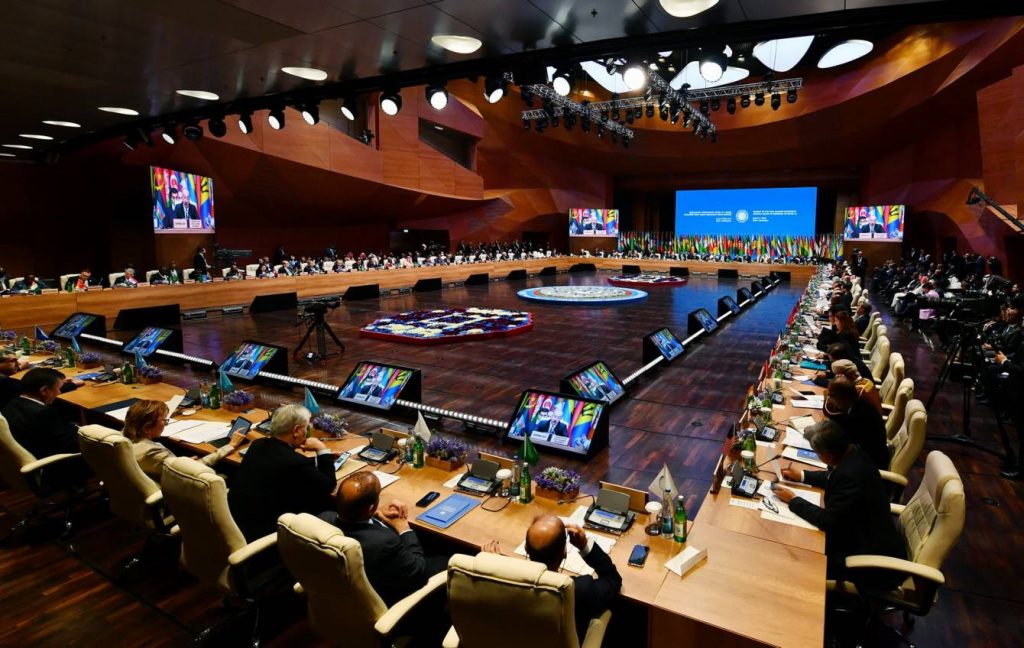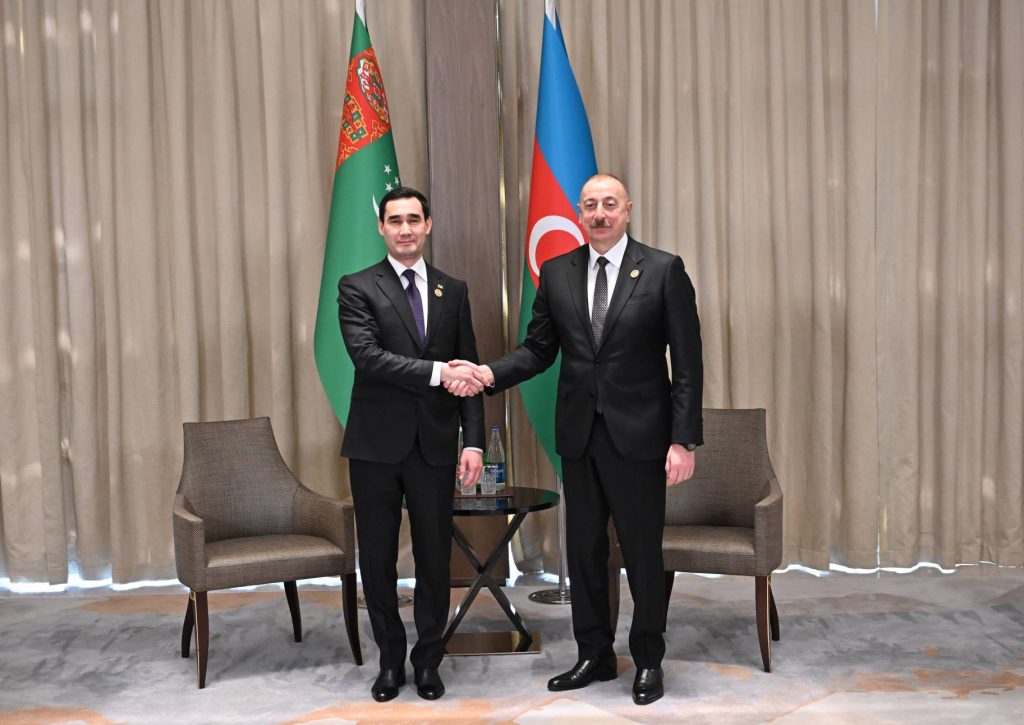nCa Report
On Thursday, 2 March 2023, President Serdar Berdimuhamedov visited Baku, Azerbaijan, where he took part in the Summit of the Non-Aligned Movement Contact Group in response to COVID-19.
The Summit, chaired by Azerbaijan, was attended by heads of state and government of about 70 countries, presidents of 5 countries, including Bosnia and Herzegovina, Turkmenistan, Uzbekistan, Iraq, Libya, vice-presidents of three countries – Cuba, Gabon, Tanzania, Prime Ministers of Algeria and Kenya, high–ranking representatives of various countries, as well as heads and high-ranking representatives of international organizations – the World Tourism Organization, the International Organization for Migration (IOM), the Geneva Office of the United Nations, the International Atomic Energy Agency (IAEA), the Organization for Economic Cooperation, the Organization of Turkic States, ministers, deputy ministers, ambassadors and others.
Turkmenistan has been a member of the Non-Aligned Movement since October 1995.
The Non-Aligned Movement (NAM) was established in 1961 in order to defend the interests of developing countries in the face of Cold War confrontation. To date, NAM has 120 Member countries, or 60 percent of the United Nations membership. 17 States and 10 organizations have observer status in NAM. Azerbaijan is the Chairman of the NAM in 2019-2022.
“Ensuring a joint and adequate response to the challenges of the modern world, guided by the Bandung Principles” is the main topic of the NAM summit in Baku.
Opening the summit, Azerbaijani President Ilham Aliyev noted that the pandemic had a negative impact on the implementation of the Sustainable Development Goals (SDGs) until 2030, pointing to the need to intensify global efforts to prevent, among other things, deviation from the set goals and catch up in the implementation of the Agenda for the period up to 2030.
He called on all NAM members to support the initiative to create a UN High-level Panel of Experts on Global Recovery after COVID-19. This panel can develop recommendations on global measures for the post-pandemic period.
“As during the COVID-19 pandemic, Azerbaijan will continue to provide financial and humanitarian assistance to the NAM countries in need,” Aliyev said. He announced two global calls: in support of the post-pandemic recovery of Africa and small island developing nations. As the first donor, Azerbaijan allocated US$ 1 million for both global appeals.
In the speech of the president of the 77th session of the United Nations General Assembly, Csaba Kőrösi stressed that humanity is obliged to learn lessons from the pandemic and prepare for future shocks, the Chairman of the General Assembly believes. According to him, scientists predict about a 25% chance of another disease that will be at least as deadly and widespread as COVID within 10 years. “Given these odds, we are now in a race against the clock to identify transformative solutions that will make our world safer, more equal, and more sustainable,” Kőrösi added.
Tedros Adhanom Ghebreyesus, WHO Director General, addressed the summit via video link. He emphasized the need for active involvement in the financing of the World Health Organization and noted that investing in the creation of local production is a priority goal.
The summit was held in several plenary sessions led to adoption of the final statement.
Speech by President of Turkmenistan Serdar Berdimuhamedov
(Here is slightly paraphrased translation of the speech by President Serdar Berdimuhamedov)
Dear Heads and members of delegations!
Ladies and gentlemen!
First of all, let me express my gratitude to the President of the Republic of Azerbaijan, His Excellency Ilham Aliyev, for the initiative to convene this Summit, his excellent organization and hospitality.
The consequences of the coronavirus pandemic today are one of the most urgent and serious challenges of our time. And this problem, of course, is not limited to purely medical aspects – it directly affects the political, economic, socio-humanitarian realities of global development, emphasizing the need to find new adequate mechanisms for relations between states and international institutions to overcome the difficult situation in which we all find ourselves.
Under these conditions, the role of the Non-Aligned Movement as an association of states following the ideals of equality, justice and humanism is objectively increasing, requiring us to make an active and proactive contribution to overcoming the consequences of COVID, to declare clear and understandable directions and priorities of interaction.
First of all, we are talking about the formation of a common political and ideological platform for joint work. It should be based on the principles of solidarity, mutual assistance, and indivisible responsibility. Only by working together and combining our efforts will we be able to create conditions for overcoming the pandemic’s consequences, ensuring against its recurrence, developing the necessary protective mechanisms, and restoring economic and trade ties. It is obvious that the end of the pandemic’s acute phase does not mean complete victory over it.
And it is for this reason that we must not only maintain but also consistently increase the level of our partnership.
Among the priorities we see the systematization of cooperation between the NAM countries on the scientific and medical line. It is necessary to activate the exchange of experience, methods in the field of countering dangerous infectious diseases, to put this work on a regular and permanent basis. I am convinced that each of our countries has valuable achievements, successful examples that are designed to become the property of all. In this regard, we propose to think about creating a Single bank of information and methods of NAM for the fight against infectious diseases, accessible to all members of our organization. As a groundwork for joint work in this direction, it is advisable to discuss the issue of convening a special Conference of medical and sanitary institutions of the Non-Aligned Movement with the involvement of practitioners, scientists, experts, other representatives of the medical community, as well as other structures and departments related to countering the new threat and overcoming the crisis situation associated with it. Of course, it is open to all other interested states and organizations.
The most important condition for successful efforts to overcome the consequences of COVID is our close cooperation with the World Health Organization. Time has shown that WHO has generally coped with the functions assigned to it, and there is no reason to doubt its competence and professionalism. In this regard, we call on the Non-Aligned Movement to provide constant political, moral and other support to WHO, to confirm its continued commitment to cooperation with this organization, recognition of its main coordinating role in protecting human life and health on a global scale.
In the current scenario, I believe there is a need to build effective, minimally formalized channels of cooperation between the Non-Aligned Movement and WHO, especially through our countries’ medical communities. Let’s consider the schemes and forms of such work.
I would like to take this opportunity to express Turkmenistan’s full support for WHO’s activities and sincerely thank its management and staff for their dedicated and professional work. Our country will continue to work closely with this organization and is ready to continue to provide it with all possible assistance.
In this context, Turkmenistan will continue to promote its previously expressed initiatives aimed at enhancing multilateral cooperation through scientific diplomacy. In particular, we confirm our country’s earlier proposals on the establishment of the following international and regional instruments:
The Special Program of the World Health Organization for the study of the coronavirus genome; the Multilateral Mechanism of the World Health Organization to response Pneumonia; the Methodological Center of the World Health Organization for the Treatment and Prevention of Acute Infections; the Central Asian Regional Center for Epidemiology, Virology and Bacteriology.
We also believe that, with WHO’s aid and coordination, a more efficient and equitable logistics system for the timely and uninterrupted delivery of medicines and medical equipment to the most vulnerable states is required. I believe we should engage in more active cooperation with other UN humanitarian structures here.
Dear participants!
In the coming period, it is necessary to achieve a consistent approach to the restoration of international economic and trade relations.
In this regard, we call on the NAM States to actively work on restoring and strengthening the stability of international transport systems in emergency situations. There is a good basis for this – the UN General Assembly Resolution “Strengthening ties between all modes of transport to ensure stable and reliable international transportation for sustainable development during and after the coronavirus disease pandemic (COVID-19)”, adopted on the initiative of Turkmenistan on July 29, 2021.
At the same time, we consider it timely to start drafting a Resolution of the UN General Assembly “On enhancing the role of landlocked developing countries in the development and strengthening of global transport cooperation.” It seems that such a document is able to give a meaningful impetus to the promotion of the interests of these states, many of which are members of the Non-Aligned Movement, to show the importance and understanding of the relevant problems, the commitment of the world community to their solution. Turkmenistan is ready to start preparing a document open to all constructive suggestions and recommendations. We look forward to the participation of Non-Aligned Countries in this work.
Also, in the context of minimizing the negative economic consequences of the pandemic, Turkmenistan considers it necessary to strengthen the interaction of NAM with relevant UN structures, primarily with the Economic and Social Council.
The most important aspect of our activity in the post-crisis global economy is the consolidation of the positions of the NAM countries in protecting the legitimate rights and interests of developing countries, actively upholding justice and equality in international economic relations. Here our goal should be clearly and fundamentally formulated: the restoration of economic ties should not harm developing countries and take place at their expense.
I am convinced that today we have a chance to build a new system of economic and trade world order, in which there will be no place for discrimination, artificial barriers, unfair distribution of resources. In recognizing the economic sovereignty of peoples and States, the voice of the Non-Aligned Movement should sound firm and weighty, we should proactively and responsibly promote our own economic agenda.
In this regard, the active participation of Non-Aligned States in the formation of a global energy security system based on fair and transparent principles, equal access to energy sources and means of their delivery, consideration and recognition of the interests of suppliers, buyers and transiters of energy resources is of great importance.
The most important component of post-crisis recovery is the joint work of the Non-Aligned Movement States in the implementation of the Sustainable Development Goals, including in such a part as food security. The pandemic has exposed the vulnerability of precisely those States where this problem has not been solved, where the population does not receive adequate nutrition. Unity and firmness of the positions of the Non-Aligned Countries are necessary when considering issues of ensuring access of states and regions to food resources, in ensuring guarantees of adequate nutrition as an inalienable right of any person, a key factor of health and normal physical development, especially children.
Of course, all the listed tasks of post-crisis recovery are possible only in conditions of lasting peace and equality.
Therefore, we call on the Non-Aligned Countries in the coming period to strengthen their consolidated approaches in the struggle to achieve universal stability and security, to overcome conflicts and escalations of tension, to seek the establishment of a culture of respectful dialogue, trust and predictability in interstate relations, to strengthen the role of international law and the UN Charter as the political and legal foundation of the modern world order and security architecture.
As you know, this year, on the initiative of Turkmenistan, was declared by the UN General Assembly “The International Year of Dialogue as a Guarantee of Peace.” From this high rostrum, I would like to express my gratitude to all the States of the Non-Aligned Movement that have come out in support of this initiative. A number of them have become co-sponsors of the relevant resolution. This fact convincingly showed the unity of our goals and aspirations, loyalty to the peace-loving, humanistic principles of our association.
In conclusion, let me express my gratitude to the fraternal Republic of Azerbaijan for its effective chairmanship in the Non-Aligned Movement, its great contribution to the implementation of the goals set today and in the future.
Meeting with the President of Azerbaijan
On the same day, President Serdar Berdimuhamedov met with President Ilham Aliyev at the Baku Congress Center.
The sides discussed the development of bilateral relations in the field of political affairs, economy and trade, the humanitarian sphere, within the framework of international organizations, primarily the United Nations.
As part of the exchange of views on topical issues of the regional and global agenda, the presidents noted the existence of mutual understanding between two countries on the main issues of our time – the maintenance of universal peace and stability, countering the threats of international terrorism, ensuring sustainable energy and transport, water security, environmental protection and climate change.
Trade and economic relations were named among the most important areas of bilateral partnership.
Having identified transport, logistics and energy spheres among the key vectors of interstate cooperation, the heads of state stressed that the strategically significant geographical position of Turkmenistan and Azerbaijan between Asia and Europe allows for close partnership in this direction, including the implementation of large-scale international projects in these areas.
Azerbaijan is expanding its transport and transit capacity, which opens up more options for the future transit of cargo from Turkmenistan across its borders, according to Aliyev.
As the presidents stressed, cultural and humanitarian partnership is a significant vector of Turkmen-Azerbaijani cooperation. In this regard, a proposal was made to organize festivals and cross-cultural Days in the near future.
***
On the same day, President Serdar Berdimuhamedov returned to Ashgabat. ///nCa, 3 March 2023 [photo credit – official website of President of Azerbaijan]




